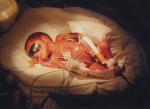Reducing baby breathing problems
 Obstetrics & Gynaecology Obstetrics & Gynaecology
Breathing problems in premature babies can be reduced by giving repeat doses of corticosteroids during pregnancy, according to a major international study led by researchers at the University of Adelaide. A single course of corticosteroids - of betamethasone - was known to reduce the risk of respiratory disease and other problems in pre-term babies but whether there was potential for further benefit by repeating the dose for women at ongoing risk of an early birth remained unknown. The findings of this study, published last month in the international medical journal The Lancet, show babies born to women who received repeat corticosteroids were less likely to have respiratory problems after birth and the breathing problems were less likely to be severe. They had less need for oxygen therapy and shorter times needing breathing support. Study leader Professor Caroline Crowther from the University of Adelaide's Discipline of Obstetrics and Gynaecology, based at the Women's and Children's Hospital, said: "Within Australia just under 3% of all births, or 6,500 women each year, give birth to a baby very pre-term at less than 34 weeks. Babies born early often have respiratory problems due to immature lung development and require neonatal intensive care. Not all babies born early survive and those that do are at increased risk of later developmental problems. Researchers are looking for a means of reducing these difficulties." The study, known as the Australasian Collaborative Trial of Repeat Doses of Steroids, or ACTORDS, is the largest in the world to date, with 982 women and their 1146 babies recruited, and involving 23 hospitals in Australia and New Zealand. Professor Crowther said longer follow-up of the children in the study was needed to see if repeat prenatal corticosteroids had long-term effects. "These short-term results are promising but the results of the two-year and later early school age follow-up for the children in the ACTORDS trial are needed to provide information about the later health and development of the children," she said. All women recruited to this study had already been given corticosteroids a week or more before. Half the women in the study were given repeat treatment with corticosteroids and the other half given a salt water placebo. The results have been presented by Professor Caroline Crowther at the Perinatal Society Australia and New Zealand Congress. The trial was designed by a group of researchers from the University of Adelaide's Discipline of Obstetrics and Gynaecology and Public Health, together with Perinatal Medicine, Women's and Children's Hospital, Adelaide. Funding was obtained from the National Health and Medical Research Council, The Women's and Children's Hospital Research Foundation and The Channel 7 Research Foundation of South Australia. Story by Robyn Mills
|





